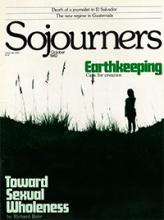After several requests to write a series of articles on sexuality and after an invitation to help advise the Catholic bishops on their pastoral statement on sexual morality, I have discovered a strange and uncharacteristic reticence within me. I still have not answered the bishops' personal letter (if not disobedience, certainly disrespectful!), and I cannot believe that I am actually beginning to write this article.
Why am I procrastinating? What am I afraid of? Undoubtedly my attitude toward this very favorite subject is revealing one of the central problems that we must deal with here: human sexuality has been so long denied a hearing that it remains in a shadowlike world and is seldom retrieved in a positive and creative way. Such a powerful aura surrounds the subject, which is both terribly attractive and wonderfully frightening, that I am quite sure we are dealing with a character of holiness.
After many years of serving as a retreat master for Christian groups of every sort, the last five largely for Catholic priests, and after 10 years as pastor of a large lay community, I am convinced that our sexual lives are the most universally damaged parts of our human nature. Just about everyone will admit that they really do not understand and often do not like what they see happening and not happening in their sexual experience. It is surely both demon and divine messenger, but most of us seem to be meeting the demon in one disguise or another.
I do not presume that we can change all of that in two articles, but I do believe that this moment in our history provides us with an opportunity to open some doors and shed some healing light on a shadowy subject.
Read the Full Article

